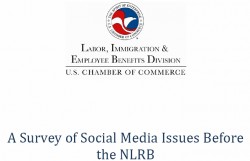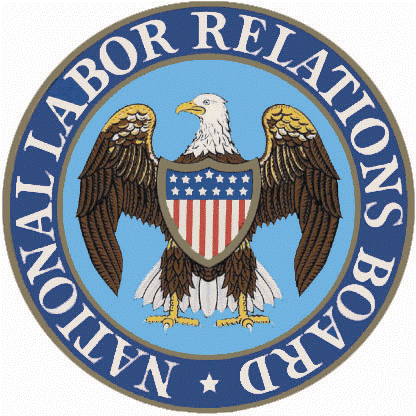When Dawnmarie Souza called her boss a “scumbag” on Facebook last year she was fired.
It wasn’t just the offensive comment (one of several) that got her in trouble, said her employer, American Medical Response, but “multiple, serious issues.” Among them, was Souza’s violation of the company’s blogging and Internet policy, which prohibited “making disparaging, discriminatory or defamatory comments when discussing the Company or the employee’s superiors, co-workers and/or competitors.”
She complained to the National Labor Relations Board.
What happened?
Most cases allege “overbroad” employer policies
The NLRB sued, claiming that Souza’s Facebook posting was protected activity and that AMR’s Internet policy was an overbroad infringement on worker’s rights. The case was settled a few months ago with AMR rewriting its policy on blogging and social media usage.A separate, confidential settlement was reached with Souza.
This is but one of over a 100 cases involving social media that have reached the NLRB in just the last few years. More are on the way.
As of now, there are no clear cut rules regarding what is protected speech under the National Labor Relations Act, but a study of the cases by the U.S. Chamber of Commerce has identified some emerging themes.
In the 40-page survey, the chamber said that the cases pursued by the board vary in the nature of the charges, which include issues of concerted activity, protected activity, failure to bargain, work time, and so forth.
However, the report says:
The issues most commonly raised in the cases before the Board allege that an employer has overbroad policies restricting employee use of social media or that an employer unlawfully discharged or disciplined one or more employees over contents of social media posts.”
Some 45% of companies have no social media policy
That’s more than a little surprising considering an informal poll by the global law firm Proskauer & Rose found 45 percent of the companies it surveyed had no social networking policy at all. In 2009, CareerXroads asked its blue chip clients about their social media policy and came up with an almost identical 44.4 percent that had no policy.
Nonetheless, the Chamber’s survey shows the NLRB cases and memoranda addressing social media issues pay closest attention to policies restricting “discussion of wages, corrective actions and discharge of co-workers, employment investigations, and disparagement of the company or its management.”
 Adds the Chamber, “The context in which the policy was adopted and even the issue of whether a rule or policy has been actually adopted are also important in these cases.”
Adds the Chamber, “The context in which the policy was adopted and even the issue of whether a rule or policy has been actually adopted are also important in these cases.”
In a blog post about the Chamber survey, Manpower’s Chief Legal Officer Mike Toth wrote that “Employers are getting themselves in trouble in two basic ways: (1) overbroad policies restricting employee SM (social media) use and (2) employee discipline based on SM usage.”
Where company policies prohibit all disparaging comments (as in the AMR case) or which prohibit all discussions of wages, working conditions, or discipline, or similarly broad policies, the NLRB is taking action. And it’s not dependent on union activity. Indeed, the Chamber specifically says, “a significant percentage of cases in our survey involved non-union employers with no union activity.”
The rules are still emerging
However, as the Chamber survey notes, the issues have only begun to arise and the rules are still emerging. But in three matters in the last few weeks, the NLRB has provided some guidance on social media postings where it won’t interfere with the discipline.
Baker & Hostetler employment attorney Leah Williams suggests two of these situations are when:
1. The employee’s work complaints on Facebook were made only to family or friends; or
2. The employee’s complaints expressed only an individual gripe with the employer, rather than concerns expressed by employees collectively.
The “family and friends” situation came out of two cases in which employees were terminated for complaining on Facebook about customers and the people in their care. Only family and friends saw the postings, though eventually the employers found out.
Because no co-workers saw the posts, and they weren’t discussed with other workers, the NLRB found they didn’t constitute collective action or concerns,, Nor, said the NLRB in advice memoranda, did they relate to the terms and conditions of work.
The second situation was more problematic, since the terminated employee did address working conditions in his Facebook posting, and it was not only seen by his co-workers, but they added comments of their own.
Some takeaways you can focus on
However, the NLRB characterized it as was venting. The “Facebook postings were an expression of an individual gripe, said the advice memorandum from the NLRB’s General Counsel. Since there was “no language suggesting the Charging Party sought to initiate or induce coworkers to engage in group action,” no collective action was involved.
Williams concludes her analysis of the three cases saying:
…it appears that social media communications that are solely on the employee’s behalf (e.g., posts that are not communicated to coworkers or management) or communications that are individual in subject matter (e.g., posts that may be communicated to coworkers but concern only an individual gripe) are not concerted activities and, therefore, are not protected under the NLRA.
What are the takeaways?
First of all, review your policies regarding employee speech. Be sure that if your policy includes language prohibiting certain types of blogging and social media posting, it makes clear it doesn’t apply to actions protected by the NLRA.
When disciplining an employee for what they posted online, examine the extent to which the post deals with the terms and conditions of employment, and who the audience is. Obviously, if it seeks to rally coworkers to action, it’s almost certain to be protected concerted action. Even absent a specific call to action, a discussion of such issues with coworkers will be protected.
